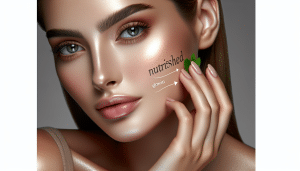Unlocking the Power of Collagen for Radiant Skin
Ella Knight September 13, 2025
Curious about why collagen gets so much attention in beauty circles? This guide explores how collagen supports skin health, the difference between supplements and topical uses, and tips for boosting your own natural collagen production for a radiant, youthful appearance. Dive into the science and discover what really works for your skin.
Understanding Collagen and Its Role in Skin Health
Collagen is the most abundant protein in the body and serves as a fundamental building block for skin, hair, and connective tissues. It’s responsible for giving skin firmness, structure, and elasticity—qualities closely linked to a youthful look. As people age, collagen production naturally declines, contributing to common signs such as fine lines and sagging. This gradual decrease has captured the focus of many wellness enthusiasts who want to preserve that much-admired glow. The connection between collagen, skin health, and overall appearance is well documented, making this protein a central theme across many beauty routines (Source: https://www.nih.gov/news-events/nih-research-matters/how-collagen-keeps-skin-young).
Besides its structural role, collagen interacts with other important skin components like elastin and hyaluronic acid. This network forms the supportive matrix beneath the skin’s surface, influencing moisture retention, resilience, and resistance to environmental damage. Lifestyle choices like sun exposure, poor diet, and smoking can accelerate collagen breakdown, underscoring how daily decisions have a real impact on healthy skin. As collagen wears down, visible changes appear, leading many to wonder about ways to support or replenish what’s lost.
Many are surprised to learn that collagen’s benefits extend far beyond aesthetics. It can impact wound healing, joint health, and even gut function. However, the focus here will remain on skin wellness, as more choose to include collagen-boosting practices in self-care routines. Knowing what influences natural collagen synthesis can empower decisions and set realistic expectations for products or treatments promising transformative results.
Exploring Collagen Supplements: What Evidence Shows
The booming collagen supplement market offers powders, capsules, and beverages claiming to restore a youthful appearance. Products often come in hydrolyzed form, breaking collagen down into peptides for easier absorption. Some research suggests daily supplementation may help boost skin hydration, elasticity, and smoothness. Users often report feeling subtle improvements over several weeks, fueling this wellness trend. It’s important to separate personal anecdotes from scientifically validated benefits (Source: https://ods.od.nih.gov/factsheets/Collagen-Consumer/).
Not every supplement works the same way or for everyone. The body’s ability to absorb and utilize these peptides still varies from person to person based on genetics, diet, and lifestyle. Some clinical reviews have found modest but statistically significant improvements in skin hydration and elasticity among supplement users compared to those taking a placebo. But the effects don’t necessarily persist once supplementation stops, highlighting the importance of a holistic, consistent approach alongside supplementation.
Brands may tout unique formulas, but choosing safe, reputable options is key. Medical experts advise looking for third-party testing and avoiding fillers or unverified claims. Plant-based alternatives, while less common, exist for those with dietary restrictions. Using supplements does not replace foundational habits like sun protection or balanced nutrition, but it may offer support as part of a broader skin wellness strategy.
Topical Collagen: Can Creams and Serums Deliver Results?
Topical collagen creams and serums promise firmer, plumper skin, instantly sparking interest among those seeking non-invasive beauty options. The topical application of collagen can make skin feel softer and temporarily more hydrated. Some formulas pair collagen with other active ingredients like peptides or antioxidants, aiming to maximize the overall benefit. This approach appeals to those looking for an accessible self-care routine without supplements or procedures.
However, collagen molecules are relatively large and traditionally struggle to penetrate deeply into the skin’s layers. This limitation means most topical formulations focus on supporting the skin barrier, rather than replacing deeper stores of collagen like supplements might do. Despite this, creams can still soothe dry patches and provide short-term cosmetic benefits, creating a smoother surface for makeup or a dewy finish for fresh-faced styles (Source: https://www.aad.org/public/everyday-care/skin-care-basics/secrets/collagen).
Many dermatologists stress managing expectations with topical collagen products. While they don’t deliver the same profound results as medical treatments, high-quality moisturizers can complement an overall routine. Products containing collagen-boosting peptides or retinoids may be more effective for jumpstarting natural production. Reading ingredient labels, checking for fragrance-free options, and patch-testing can help sensitive skin users find the right fit.
Lifestyle Factors for Boosting Natural Collagen Production
Supporting your own natural collagen production is an empowering step toward radiant skin. Nutrition stands out as a powerful influence. Diets rich in vitamin C, amino acids, zinc, and copper provide the building blocks the body needs to synthesize new collagen. Including foods like citrus, berries, leafy greens, and lean proteins can help the body maintain healthy levels and repair daily wear-and-tear.
Aside from nutrition, protecting against ultraviolet (UV) exposure is critical. Sun damage accelerates collagen breakdown more than any other external factor. Wearing broad-spectrum sunscreen daily, seeking shade, and avoiding tanning beds are practical steps for long-term skin resilience. Sufficient hydration and adequate sleep further support the skin’s repair processes, while habits like smoking or excessive alcohol use can undermine these efforts (Source: https://www.ncbi.nlm.nih.gov/pmc/articles/PMC3583891/).
Exercise and stress management also play a role in holistic skin health. Regular movement can improve circulation, delivering oxygen and nutrients for healthy cellular turnover. Meanwhile, chronic stress may disrupt skin healing and regeneration. Incorporating relaxation techniques, whether through mindfulness, yoga, or simple hobbies, creates an environment for natural collagen-building. Combining these practices with targeted skincare and possible supplementation forms a multi-dimensional approach to boosting skin vitality from within.
Innovative Treatments: Microneedling and Laser Therapies
While over-the-counter options are popular, some seek professional treatments like microneedling or laser therapy for a more targeted collagen boost. Microneedling uses fine, controlled needles to create micro-injuries that stimulate natural collagen production as the skin heals. This procedure is typically performed by dermatologists or licensed aestheticians and may improve texture and firmness over a series of sessions.
Laser treatments, including fractional or non-ablative lasers, target the deeper layers of the skin to encourage regenerative processes. Research has shown these therapies can, over time, improve fine lines, scars, and overall tone by initiating collagen remodeling. However, results depend on the technology used, practitioner experience, and post-procedure care. Candidacy for these methods varies, and possible downtime or side effects should be factored in before choosing a direction (Source: https://www.plasticsurgery.org/news/blog/microneedling-and-laser-treatments-101).
Consulting a board-certified dermatologist can help tailor options to unique skin needs and goals. Approaching these procedures as part of an overall wellness and beauty plan—which includes home care, nutrition, and protection—can yield sustainable, noticeable improvements. Even with advanced treatments, lasting results depend on consistent aftercare and supporting the skin from within.
Fact or Fiction: Common Myths About Collagen
Misinformation about collagen circulates widely online. A common myth suggests topical collagen erases wrinkles overnight, but scientific reviews indicate results are generally modest and don’t rival procedural options. Misleading headlines promising dramatic “reverse aging” make it important to recognize what’s realistic and what isn’t. Setting clear expectations leads to less frustration when starting new routines.
Another misconception is that animal-derived collagen is always superior to plant-based formulas. While animal sources like bovine or marine collagens are well-studied, some plant peptides and extracts can support skin hydration and texture by boosting the skin’s own synthesis. The key is understanding that dietary and topical products play different roles, and neither offers miraculous overnight results (Source: https://www.health.harvard.edu/blog/the-science-of-collagen-2020031819158).
Some also believe that ingesting collagen guarantees immediate effects regardless of lifestyle. Actually, factors like sun protection, stress, and balanced eating contribute just as much. None of these approaches work in isolation. Getting results happens over time, and combining strategies helps maximize potential. Ask questions, consult reputable sources, and observe your skin’s unique reactions to fine-tune your approach.
References
1. National Institutes of Health. (n.d.). How collagen keeps skin young. Retrieved from https://www.nih.gov/news-events/nih-research-matters/how-collagen-keeps-skin-young
2. Office of Dietary Supplements, NIH. (n.d.). Collagen. Retrieved from https://ods.od.nih.gov/factsheets/Collagen-Consumer/
3. American Academy of Dermatology Association. (n.d.). Collagen: What it is and how it can be used in skin care. Retrieved from https://www.aad.org/public/everyday-care/skin-care-basics/secrets/collagen
4. National Center for Biotechnology Information. (2013). Nutrition and skin aging. Retrieved from https://www.ncbi.nlm.nih.gov/pmc/articles/PMC3583891/
5. American Society of Plastic Surgeons. (n.d.). Microneedling and laser treatments 101. Retrieved from https://www.plasticsurgery.org/news/blog/microneedling-and-laser-treatments-101
6. Harvard Health Publishing. (2020). The science of collagen. Retrieved from https://www.health.harvard.edu/blog/the-science-of-collagen-2020031819158







